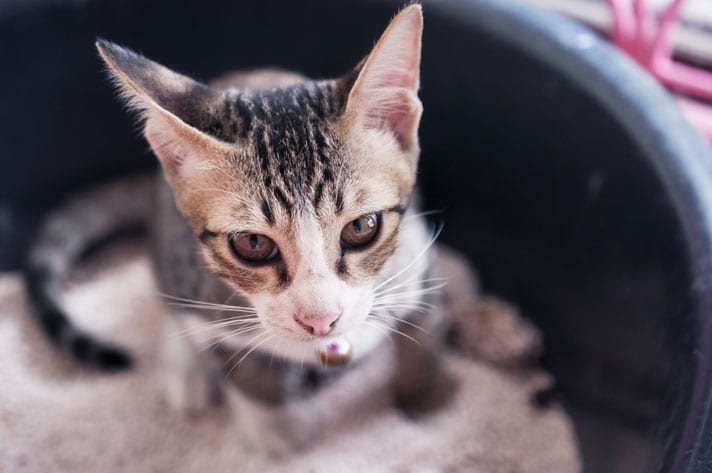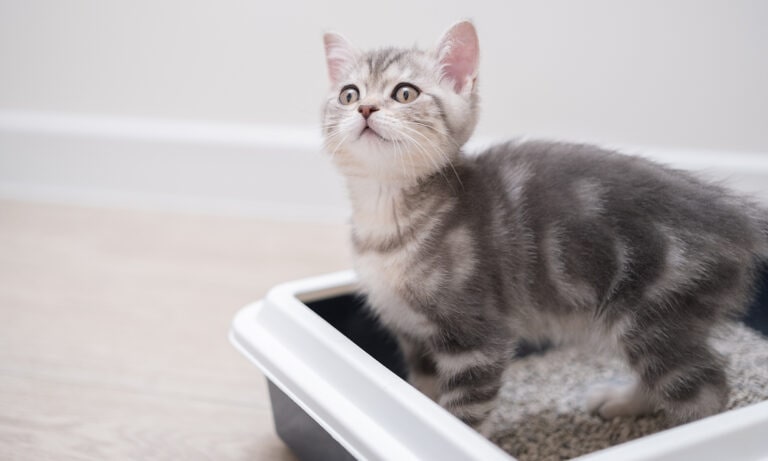So your kitten is no longer using the litter box. Your fuzzy little bundle of love was behaving so well, and life was absolutely purrfect — until you found a “dirty deed” where it wasn’t supposed to be. What’s a devoted (but frustrated) kitten owner to do at a time like this?
Here’s the short answer: Don’t panic, don’t blame your kitten, and have hope — you can help!
This particular behavior is something many refer to as inappropriate elimination. It’s when a cat is pooping and peeing outside of his litter box, and it can happen at any stage of a cat’s life (kitten, adolescent, adult and senior). However, house soiling has now replaced the phrase inappropriate elimination, because house soiling implies that cats are not misbehaving.
But what is it that makes a kitten’s life stage different when it comes to litter box issues? Here’s what Elizabeth Arguelles, DVM, owner and medical director of Just Cats Clinic in Reston, Virginia, had to say:
“For the kitten stage [birth to 6 months], litter box issues essentially start with the kitten learning to use the litter box in general. Most kittens learn to use the litter box between the ages of 4 to 6 weeks. Inappropriate elimination can simply be them learning the ropes of the box. Typically, at this stage of life, it’s likely more a behavior issue, but there are possible medical concerns.”
If your kitten begins to go to the bathroom outside of the litter box after having been using it regularly, it may very well be a behavioral or environmental issue that will be relatively easy to correct. As Arguelles points out, it may also be a medical issue that needs your attention. In either case, house soiling is a red flag that needs your attention. Let’s look at some of the issues common to both circumstances and learn how to address them.
Medical Issues In Kittens
Intestinal issues, parasites, and urinary tract infections are just a few of the many medical issues that can cause kittens to stop using the litter box. It’s important to get your kitten to the veterinarian at the first sign of house soiling to rule out any medical issues. If it’s determined that your kitten isn’t suffering from a medical problem, then you can begin to look around your home to see what could be causing your kitten to avoid the litter box.
Environmental Issues That Can Cause Kitten Litter Box Problems
Now let’s look at some home environment issues that may be causing your kitten to go to the bathroom outside of her box. Be honest and objective with yourself as you ask, “Are any of these things happening in my home?”
- Your kitten was declawed
- You have had friends/family visiting
- Another animal has been added to your family
- You recently moved
- You changed his food
- Your kitten is on medication
- There is construction taking place in or around the home
- The cat litter box is not as clean as it used to be
- You changed the brand of litter
- The litter box has been moved
- The size of the litter box has changed
- You changed the litter mat
- You, or other family members in the home, have been stressed
- Your kitten has recently had surgery
- You are using a new cleaner in or near the litter box
- Your kitten has become more fearful in general
- You have been gone more often, so your kitten has been spending more time alone
If you answered yes to any of these things, congratulations! You’ve started to piece together the clues that will help you begin to solve the mystery of house soiling. Try not to feel overwhelmed. Something is deterring your kitten from using her litter box, and if you’re committed to understanding why, I guarantee that you’ll discover something that’s key to your kitten’s undesirable behavior. Read on to learn how I dealt with my own kitten’s litter box problems.
Knox and His Box
Our formerly feral kitten, Knox, suddenly stopped using his litter box. There didn’t seem to be an obvious reason, but as I explored our home environment and asked myself some questions about what might be afoot, I began to uncover some clues.
I had recently had a party at my house, and had moved the litter box to an area that would be out of view to my guests. When the party was over, I never moved the litter box back to its original location. The new location had been convenient for me, but I realized that it was in an area that was scary for a wee kitten. I moved the box back to where it had been before, but he still wasn’t using it! Then I remembered that when Knox was feral, he had free reign of the backyard. Soil, grass, sand and clay were his to choose from when he needed to do his kitty business. His new life indoors didn’t offer him those options! I added some of the soil from the back yard to his litter box, and – voila! – he was using the litter box again! He just needed something familiar to entice him back to the “business box.”
Additional Tips
We’ve covered some of the causes of house soiling, but here are some additional steps you can take to make your efforts more effective. Here are a couple of important tips:
Always Avoid Punishment
Punishment in any form (rubbing your kitten’s nose in it, squirting them with water, shaking a can of coins, etc.) never helps. If we punish a cat for house soiling, it doesn’t stop the behavior. It merely suppresses it. What you’re actually doing is making your cat afraid of you, and afraid of people in general. To avoid being punished again, your kitten will find a way to eliminate in a more secretive place where you can’t catch her and punish her again.
Set Your Kitten and Yourself Up for Success
Help your kitten associate his litter box with good things. Be patient with yourself as you work through your litter box issues. As frustrating as it can be, remember that it takes objective insight, time, patience and a lot of love and devotion. You adopted a wonderful kitten who will be a feline family member for life. He will succeed as long as you don’t give up!
Find out more about kitten litter training and how to train your cat to use the bathroom outside.
By: Amy Martin
Featured Image: tum07007500/iStock/Thinkstock
Share:









